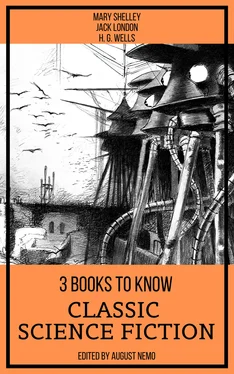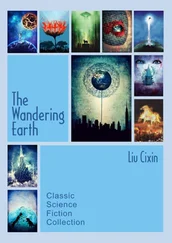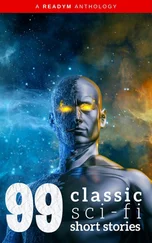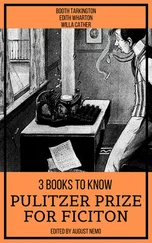As yet, of course, few people in Woking even knew that the cylinder had opened, though poor Henderson had sent a messenger on a bicycle to the post office with a special wire to an evening paper.
As these folks came out by twos and threes upon the open, they found little knots of people talking excitedly and peering at the spinning mirror over the sand-pits, and the newcomers were, no doubt, soon infected by the excitement of the occasion.
By half past eight, when the Deputation was destroyed, there may have been a crowd of three hundred people or more at this place, besides those who had left the road to approach the Martians nearer. There were three policemen too, one of whom was mounted, doing their best, under instructions from Stent, to keep the people back and deter them from approaching the cylinder. There was some booing from those more thoughtless and excitable souls to whom a crowd is always an occasion for noise and horse-play.
Stent and Ogilvy, anticipating some possibilities of a collision, had telegraphed from Horsell to the barracks as soon as the Martians emerged, for the help of a company of soldiers to protect these strange creatures from violence. After that they returned to lead that ill-fated advance. The description of their death, as it was seen by the crowd, tallies very closely with my own impressions: the three puffs of green smoke, the deep humming note, and the flashes of flame.
But that crowd of people had a far narrower escape than mine. Only the fact that a hummock of heathery sand intercepted the lower part of the Heat-Ray saved them. Had the elevation of the parabolic mirror been a few yards higher, none could have lived to tell the tale. They saw the flashes and the men falling and an invisible hand, as it were, lit the bushes as it hurried towards them through the twilight. Then, with a whistling note that rose above the droning of the pit, the beam swung close over their heads, lighting the tops of the beech trees that line the road, and splitting the bricks, smashing the windows, firing the window frames, and bringing down in crumbling ruin a portion of the gable of the house nearest the corner.
In the sudden thud, hiss, and glare of the igniting trees, the panic-stricken crowd seems to have swayed hesitatingly for some moments. Sparks and burning twigs began to fall into the road, and single leaves like puffs of flame. Hats and dresses caught fire. Then came a crying from the common. There were shrieks and shouts, and suddenly a mounted policeman came galloping through the confusion with his hands clasped over his head, screaming.
“They’re coming!” a woman shrieked, and incontinently everyone was turning and pushing at those behind, in order to clear their way to Woking again. They must have bolted as blindly as a flock of sheep. Where the road grows narrow and black between the high banks the crowd jammed, and a desperate struggle occurred. All that crowd did not escape; three persons at least, two women and a little boy, were crushed and trampled there, and left to die amid the terror and the darkness.
VII – How I Reached Home
––––––––
For my own part, I remember nothing of my flight except the stress of blundering against trees and stumbling through the heather. All about me gathered the invisible terrors of the Martians; that pitiless sword of heat seemed whirling to and fro, flourishing overhead before it descended and smote me out of life. I came into the road between the crossroads and Horsell, and ran along this to the crossroads.
At last I could go no further; I was exhausted with the violence of my emotion and of my flight, and I staggered and fell by the wayside. That was near the bridge that crosses the canal by the gasworks. I fell and lay still.
I must have remained there some time.
I sat up, strangely perplexed. For a moment, perhaps, I could not clearly understand how I came there. My terror had fallen from me like a garment. My hat had gone, and my collar had burst away from its fastener. A few minutes before, there had only been three real things before me—the immensity of the night and space and nature, my own feebleness and anguish, and the near approach of death. Now it was as if something turned over, and the point of view altered abruptly. There was no sensible transition from one state of mind to the other. I was immediately the self of every day again—a decent, ordinary citizen. The silent common, the impulse of my flight, the starting flames, were as if they had been in a dream. I asked myself had these latter things indeed happened? I could not credit it.
I rose and walked unsteadily up the steep incline of the bridge. My mind was blank wonder. My muscles and nerves seemed drained of their strength. I dare say I staggered drunkenly. A head rose over the arch, and the figure of a workman carrying a basket appeared. Beside him ran a little boy. He passed me, wishing me good night. I was minded to speak to him, but did not. I answered his greeting with a meaningless mumble and went on over the bridge.
Over the Maybury arch a train, a billowing tumult of white, firelit smoke, and a long caterpillar of lighted windows, went flying south—clatter, clatter, clap, rap, and it had gone. A dim group of people talked in the gate of one of the houses in the pretty little row of gables that was called Oriental Terrace. It was all so real and so familiar. And that behind me! It was frantic, fantastic! Such things, I told myself, could not be.
Perhaps I am a man of exceptional moods. I do not know how far my experience is common. At times I suffer from the strangest sense of detachment from myself and the world about me; I seem to watch it all from the outside, from somewhere inconceivably remote, out of time, out of space, out of the stress and tragedy of it all. This feeling was very strong upon me that night. Here was another side to my dream.
But the trouble was the blank incongruity of this serenity and the swift death flying yonder, not two miles away. There was a noise of business from the gasworks, and the electric lamps were all alight. I stopped at the group of people.
“What news from the common?” said I.
There were two men and a woman at the gate.
“Eh?” said one of the men, turning.
“What news from the common?” I said.
“Ain’t yer just been there?” asked the men.
“People seem fair silly about the common,” said the woman over the gate. “What’s it all abart?”
“Haven’t you heard of the men from Mars?” said I; “the creatures from Mars?”
“Quite enough,” said the woman over the gate. “Thenks”; and all three of them laughed.
I felt foolish and angry. I tried and found I could not tell them what I had seen. They laughed again at my broken sentences.
“You’ll hear more yet,” I said, and went on to my home.
I startled my wife at the doorway, so haggard was I. I went into the dining room, sat down, drank some wine, and so soon as I could collect myself sufficiently I told her the things I had seen. The dinner, which was a cold one, had already been served, and remained neglected on the table while I told my story.
“There is one thing,” I said, to allay the fears I had aroused; “they are the most sluggish things I ever saw crawl. They may keep the pit and kill people who come near them, but they cannot get out of it. . . . But the horror of them!”
“Don’t, dear!” said my wife, knitting her brows and putting her hand on mine.
“Poor Ogilvy!” I said. “To think he may be lying dead there!”
My wife at least did not find my experience incredible. When I saw how deadly white her face was, I ceased abruptly.
“They may come here,” she said again and again.
I pressed her to take wine, and tried to reassure her.
Читать дальше












